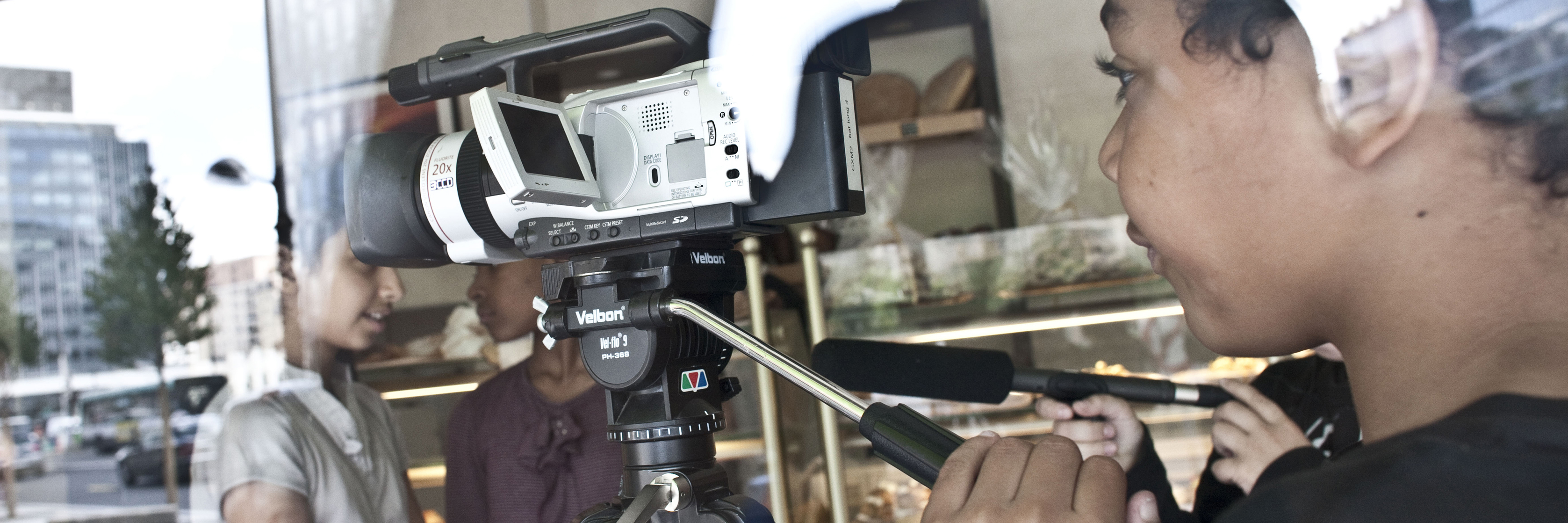DISPLACED IN MEDIA : CREATION OF A NETWORK OF ACTORS WORKING FOR THE INVOLVEMENT OF YOUNG REFUGEES IN MEDIA
The non-profit organisation Les Têtes de l’Art is a partner in the project Displaced in Media. This project is part of the Erasmus + programme and will take place over a two-year period, from November 2016 to October 2018.
The EU Youth Strategy promotes equal opportunity for young people in terms of education and employment and incite them to become active citizens.

THE REASONS BEHIND THE PROJECT
Obstacles and impediments imposed on refugees upon their arrival in Europe have turned these exiles into characters of narratives, the writing of which they were not involved in. Quite the opposite, several media have referred to of an alarming wave of migration, spreading the ancestral fear of invasion throughout Europe. Worse still, these same media relay patriotic, identity, ideological and anti-asylum-seeker hate speeches.
Young refugees are rarely heard and hardly ever considered as authoritative, as legitimate representatives for their cause or as having their own point of view. We are not provided with positive-welcome and successful-assimilation stories, nor are the EU states reminded of their responsibility for the welcoming of these exiles.
Many refugees have obtained or are in the process of obtaining asylum status in Europe. Eventually, they aim to find their place in European society as active citizens, taking part in democracy and in community life.
A European inclusive society must then offer opportunities to these newly-arrived people and allow others to benefit from their diversity, skills and knowledge.
WHAT ARE THE OBJECTIVES OF DISPLACED IN MEDIA?
The partners’ ambition is to create a platform which would support informal media literacy education for young refugees through:
-
the creation of a community of practice (sharing of practices, networking…).
-
the development of a methodology (aimed towards youth workers and media trainers).
- the making of a series of videos by refugees and its broadcast through Europe (aiming to bring a new perspective on the refugee “crisis”)
Eventually, drawing from the project experience, the partners will provide a set of policy recommendations aimed toward policy-makers, so as to favour the integration of refugees, reinforce active citizenship through newly-arrived immigrants and fight segregation and discrimination.
The methodology and pedagogical tools will be shared publicly to allow other organisations to derive inspiration from them and to imitate this initiative in their own contexts and countries. In order to publicise and spread the project’s achievements, the partners will engage in its promotion and in the creation of an online platform.
WHO ARE THE TARGETS?
The project targets media and media literacy education actors, it invites them to question their practices, methods and tools, and to adapt them, so as to allow young refugees to express themselves publicly in the media.
Throughout the project, young refugees will play an active role in the programme by giving advice and by offering a critical look on the project.
WHO ARE THE EUROPEAN PARTNERS?
This project is led by nine partners from eight European countries including France (Les Têtes de l’Art), the Netherlands, the United-Kingdom, Sweden, Turkey, Poland, Spain and Croatia. They are involved in several sectors such as: culture, media, and informal training.
The European Cultural Foundation (ECF) – one of the oldest independent cultural foundations – in Amsterdam, is the leader of the project.
For more information on the partners, you can visit their websites:
-
Doc Next Network – The Netherlands
-
ZEMOS 98 – Spain
-
TowarzystwoInicjatywTworczych « e » – Poland
-
British Film Institute Royal Charter – United-Kingdom
-
MODE Istanbul – Turkey
-
Fanzingo – Sweden
-
Kursiv – Croatia
WHAT ACTIVITIES ARE ASSOCIATED WITH THE PROJECT?
- to gather refugees’ testimony by providing them with technical means
- skilled human resources, thus, enabling them to create audiovisual content dealing with current themes and to become more inclusive in their practices and perspectives.
In spring 2018, as part of a training scheme, the participants – media literacy educationalists, experts, refugees, media representatives – will draw on their experience and define grounds upon which a common approach can be developed.
Following the two-years period, on the occasion of two European-scale events, the partners will present the results and lessons drawn from the project. They will welcome an audience of media literacy education experts in London and of political leaders in Marseille.
PRACTICALLY-SPEAKING, WHAT WILL HAPPEN IN MARSEILLE AND WHEN?
Starting in spring 2017, workshops will allow young refugees to use audiovisual tools and produce their own reports or films. They will be supervised by Boulègue – Les Têtes de l’Art’s participatory TV scheme – staff and independent professional video makers. Les Tête de l’Art will supply the necessary professional equipment (cameras, microphones, editing tools, etc.).
These video productions will be publicised during key events of the project and on a European online platforms. They may also be broadcast by our partners or in festivals.









